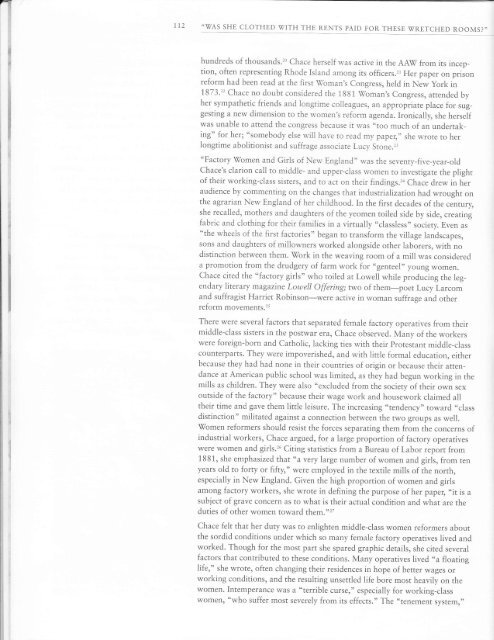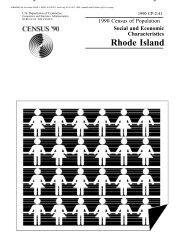Untitled - Rhode Island Historical Society
Untitled - Rhode Island Historical Society
Untitled - Rhode Island Historical Society
Create successful ePaper yourself
Turn your PDF publications into a flip-book with our unique Google optimized e-Paper software.
:::<br />
:i::<br />
=a<br />
=<br />
=<br />
=:=<br />
=<br />
=<br />
"WAS SHE CLOTHED \TITH THE RENTS PAID FOR THESE \TRETCHED ROOMS?"<br />
hundreds of thousands.2' chace herself was active in the AA\f from its inception,<br />
often representing <strong>Rhode</strong> <strong>Island</strong> among its officers.r' Her paper on prison<br />
reform had been read at the first'woman's congress, held in New york in<br />
1873." chace no doubt considered the 1881 Nfoman's congress, attended by<br />
her sympathetic friends and longtime colleagues, an appropriate place for suggesting<br />
a new dimension to the women's reform agenda. Ironically, she herself<br />
was unable to attend the congress because it was "too much of an undertaking"<br />
for herl "somebody else will have to read my paper," she wrote to her<br />
longtime abolitionist and suffrage associare Lucy Stone.'3<br />
"Factory'women and Girls of New England" was the seventy-five-year-old<br />
chace's clarion call to middle- and upper-class women to investigate the plight<br />
of their working-class sisters, and to acr on their findings.', chace drew in her<br />
audience by commenting on the changes that industri alization had wrought on<br />
the agrarian New England of her childhood. In the first decades of the century,<br />
she recalled, morhers and daughters of the yeomen toiled side by side, creating<br />
fabric and clothing for their families in a virtually "classless" society. Even as<br />
"the wheels of the first factories" began to transform the village landscapes,<br />
sons and daughters of millowners worked alongside other laborers, with no<br />
distinction between them. \7ork in the weaving room of a mill was considered<br />
a promotion from the drudgery of farm work for "genteel" young women.<br />
chace cited the "factory girls" who toiled at Lowell while producing the leg,<br />
endary literary magazine Lowell offering; two of them-poet Lucy Larcom<br />
and suffragist Harriet Robinson-were active in woman suffrage and other<br />
reform movements.2s<br />
There were several factors that separated female factory operatives from their<br />
middle-class sisters in the postwar era, chace observed. Many of the workers<br />
were foreign-born and Catholic, lacking ties with their Protestant middle-class<br />
counterparts. They were impoverished, and with little formal education, either<br />
because they had had none in their countries of origin or because their attendance<br />
at American public school was limited, as they had begun working in the<br />
mills as children. They were also "excluded from the society of their own sex<br />
outside of the factory" because their wage work and housework claimed all<br />
their time and gave them little leisure. The increasing "tendency" toward "class<br />
distinction" militated against a connection between the two groups as well.<br />
'women reformers should resist the forces separating them from the concerns of<br />
industrial workers, chace argued, for a large proportion o{ factory operatives<br />
were women and girls.'z5 citing statistics from a Bureau of Labor report from<br />
1 B 8 1, she emphasized that " a very large number of women and girls, from ten<br />
years old to forty or fifty," were employed in the textile mills of the north,<br />
especially in New England. Given the high proportion of women and girls<br />
among factory workers, she wrote in defining the purpose of her paper, "it is a<br />
subject of grave concern as to what is their actual condition and what are the<br />
duties of other women toward them."27<br />
chace felt that her duty was to enlighten middle-class women reformers about<br />
the sordid conditions under which so many female factory operatives lived and<br />
worked. Though for the most part she spared graphic details, she cited several<br />
factors that contributed to these conditions. Many operatives lived "a floating<br />
life," she wrote, often changing their residences in hope of better wages or<br />
working conditions, and the resulting unsettled life bore most heavily on the<br />
women. Intemperance was a "terrible curse," especially for working-class<br />
women, "who suffer most severely from its effects." The "tenement systemr"











